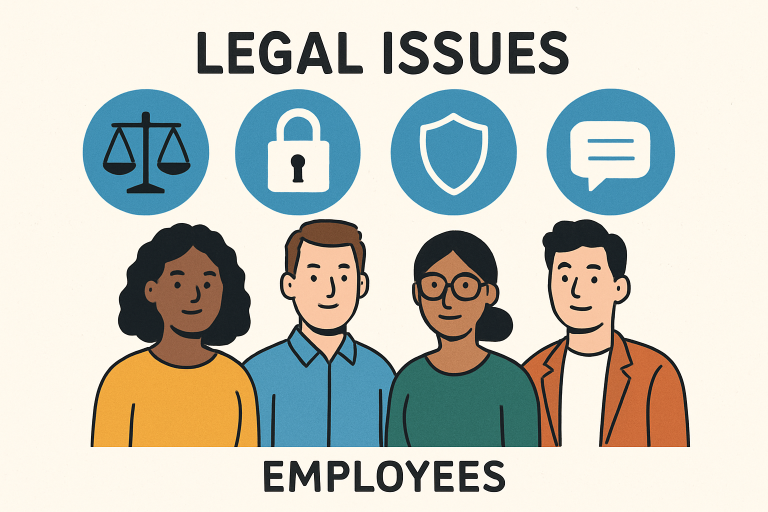Introduction
In today’s complex professional landscape, understanding your workplace rights and obligations is more important than ever. Employees frequently encounter legal issues that can significantly affect their livelihoods and well-being. Navigating these challenges with the proper knowledge can help protect you and foster a healthier professional environment. Consulting a knowledgeable Denver Business Attorney for business-specific guidance ensures that you have the legal support necessary to make informed decisions and safeguard your rights.
Workplace legal issues are daunting for employees and affect employers, shaping the culture and reputation of the organization. Whether addressing discrimination, handling disputes over wages, or protecting employee privacy, knowing where to turn and what actions to take can have significant implications for your career, peace of mind, and professional reputation.
Addressing Workplace Discrimination and Harassment
Discrimination and harassment persist in workplaces of all sizes and industries. Federal laws like the Civil Rights Act of 1964 protect against unfair treatment based on race, gender, religion, or national origin. Recent legal cases—such as a federal judge in Texas striking down guidance from the Equal Employment Opportunity Commission (EEOC) that established protections against workplace harassment based on gender identity and sexual orientation—demonstrate that discrimination regulations continue to evolve. Employees should stay alert to changes in workplace law and be prepared to advocate for themselves or seek legal redress if subjected to unfair behavior. Major publications like The Times Union offer in-depth discussions on how shifting legal interpretations impact worker protections.
Understanding Wage Discussions and Pay Transparency
It’s a common misconception that discussing pay is forbidden; the National Labor Relations Act explicitly allows employees to discuss wages and working conditions freely. These open discussions provide transparency and empower employees to challenge pay inequities or unfair practices. Staying informed about your rights to compensation discussions can enable you to identify concerns early and seek constructive resolutions. Publications like Forbes highlight how open wage discussion can create a more just and fair workplace culture.
Navigating Privacy Concerns in Remote Work
The rapid shift towards remote and hybrid working arrangements has complicated the question of workplace privacy. Employers increasingly use digital tools to monitor productivity, communications, and health metrics. However, these practices can cross legal and ethical lines. For instance, the EEOC cautioned employers about the potential for workplace discrimination through the mandatory use of wearable technology, like smartwatches and headsets. Tracking biometric data and vital signs can be considered a medical examination, typically prohibited under the Americans with Disabilities Act unless specifically job-related and necessary. Employees should carefully review workplace monitoring policies and seek clarification or legal counsel if they feel their privacy is being infringed upon.
Recognizing the Impact of AI in Hiring Processes
Artificial intelligence is revolutionizing talent acquisition, but not without new risks. If AI-enabled decision tools are improperly designed or insufficiently reviewed, they can amplify preexisting hiring biases. That’s why legislation such as New York City’s Local Law 144 now mandates independent audits of automated hiring systems to catch and correct discriminatory practices before they harm applicants. Workers and job seekers should inquire about how AI tools are used in their evaluations and ask for transparency about the safeguards to ensure fairness.
Understanding Rights During Workplace Safety Inspections
Federal standards like those enforced by the Occupational Safety and Health Administration (OSHA) are vital for maintaining safe workplaces. Recent updates to OSHA’s “walkaround rule” grant employees greater agency during inspections by allowing them to choose a non-employee—such as a union representative or a legal advocate—to participate in the inspection process. This adjustment is designed to amplify workers’ voices in identifying hazards and ensuring prompt corrective action, empowering employees to protect their safety and that of their colleagues actively.

Managing Overtime Pay and Wage Disputes
Overtime compensation is a frequent source of conflict, particularly in industries with shifting schedules or expectations of unpaid labor. Employees must remain informed about the wage and hour rules relevant to their role—especially as federal and state overtime laws continue to change. If you suspect your employer is not complying with labor standards, documenting your hours and pay and seeking timely legal guidance is advisable. Employees should stay updated on the latest regulations through resources like the Department of Labor.
Protecting Against Unlawful Workplace Policies
Some workplace policies, like overly broad confidentiality or social media agreements, can be illegal. The National Labor Relations Board has recently acted against several corporations for restricting employees’ freedom to organize or speak out about working conditions. Recognizing what constitutes a lawful versus an unlawful policy is crucial for workers who want to assert their rights without risking retaliation.
Seeking Support During Legal Struggles
Legal disputes or confrontations with employers can lead to anxiety and isolation. Many companies now offer Employee Assistance Programs (EAPs), which provide confidential counseling, legal referrals, and other support services for those confronting workplace challenges. Seeking professional support—whether through your employer, a union, or a trusted legal advisor—can help you manage stress, safeguard your rights, and resolve workplace disputes fairly.
By proactively learning about your rights and best practices in workplace law, you can protect yourself from common pitfalls and help create a more equitable and respectful workplace for everyone.

